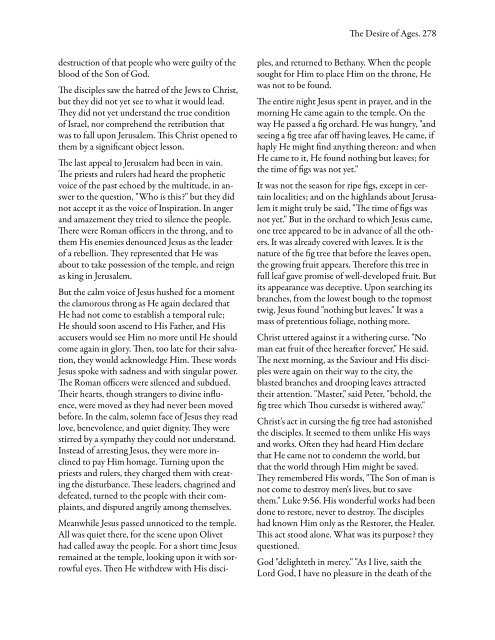The Desire of Ages - Christian Freebies
The Desire of Ages - Christian Freebies
The Desire of Ages - Christian Freebies
You also want an ePaper? Increase the reach of your titles
YUMPU automatically turns print PDFs into web optimized ePapers that Google loves.
destruction <strong>of</strong> that people who were guilty <strong>of</strong> the<br />
blood <strong>of</strong> the Son <strong>of</strong> God.<br />
e disciples saw the hatred <strong>of</strong> the Jews to Christ,<br />
but they did not yet see to what it would lead.<br />
ey did not yet understand the true condition<br />
<strong>of</strong> Israel, nor comprehend the retribution that<br />
was to fall upon Jerusalem. is Christ opened to<br />
them by a signicant object lesson.<br />
e last appeal to Jerusalem had been in vain.<br />
e priests and rulers had heard the prophetic<br />
voice <strong>of</strong> the past echoed by the multitude, in answer<br />
to the question, "Who is this?" but they did<br />
not accept it as the voice <strong>of</strong> Inspiration. In anger<br />
and amazement they tried to silence the people.<br />
ere were Roman ocers in the throng, and to<br />
them His enemies denounced Jesus as the leader<br />
<strong>of</strong> a rebellion. ey represented that He was<br />
about to take possession <strong>of</strong> the temple, and reign<br />
as king in Jerusalem.<br />
But the calm voice <strong>of</strong> Jesus hushed for a moment<br />
the clamorous throng as He again declared that<br />
He had not come to establish a temporal rule;<br />
He should soon ascend to His Father, and His<br />
accusers would see Him no more until He should<br />
come again in glory. en, too late for their salvation,<br />
they would acknowledge Him. ese words<br />
Jesus spoke with sadness and with singular power.<br />
e Roman ocers were silenced and subdued.<br />
eir hearts, though strangers to divine inuence,<br />
were moved as they had never been moved<br />
before. In the calm, solemn face <strong>of</strong> Jesus they read<br />
love, benevolence, and quiet dignity. ey were<br />
stirred by a sympathy they could not understand.<br />
Instead <strong>of</strong> arresting Jesus, they were more inclined<br />
to pay Him homage. Turning upon the<br />
priests and rulers, they charged them with creating<br />
the disturbance. ese leaders, chagrined and<br />
defeated, turned to the people with their complaints,<br />
and disputed angrily among themselves.<br />
Meanwhile Jesus passed unnoticed to the temple.<br />
All was quiet there, for the scene upon Olivet<br />
had called away the people. For a short time Jesus<br />
remained at the temple, looking upon it with sorrowful<br />
eyes. en He withdrew with His disci-<br />
e <strong>Desire</strong> <strong>of</strong> <strong>Ages</strong>. 278<br />
ples, and returned to Bethany. When the people<br />
sought for Him to place Him on the throne, He<br />
was not to be found.<br />
e entire night Jesus spent in prayer, and in the<br />
morning He came again to the temple. On the<br />
way He passed a g orchard. He was hungry, "and<br />
seeing a g tree afar o having leaves, He came, if<br />
haply He might nd anything thereon: and when<br />
He came to it, He found nothing but leaves; for<br />
the time <strong>of</strong> gs was not yet."<br />
It was not the season for ripe gs, except in certain<br />
localities; and on the highlands about Jerusalem<br />
it might truly be said, "e time <strong>of</strong> gs was<br />
not yet." But in the orchard to which Jesus came,<br />
one tree appeared to be in advance <strong>of</strong> all the others.<br />
It was already covered with leaves. It is the<br />
nature <strong>of</strong> the g tree that before the leaves open,<br />
the growing fruit appears. erefore this tree in<br />
full leaf gave promise <strong>of</strong> well-developed fruit. But<br />
its appearance was deceptive. Upon searching its<br />
branches, from the lowest bough to the topmost<br />
twig, Jesus found "nothing but leaves." It was a<br />
mass <strong>of</strong> pretentious foliage, nothing more.<br />
Christ uttered against it a withering curse. "No<br />
man eat fruit <strong>of</strong> thee hereaer forever," He said.<br />
e next morning, as the Saviour and His disciples<br />
were again on their way to the city, the<br />
blasted branches and drooping leaves attracted<br />
their attention. "Master," said Peter, "behold, the<br />
g tree which ou cursedst is withered away."<br />
Christ's act in cursing the g tree had astonished<br />
the disciples. It seemed to them unlike His ways<br />
and works. Oen they had heard Him declare<br />
that He came not to condemn the world, but<br />
that the world through Him might be saved.<br />
ey remembered His words, "e Son <strong>of</strong> man is<br />
not come to destroy men's lives, but to save<br />
them." Luke 9:56. His wonderful works had been<br />
done to restore, never to destroy. e disciples<br />
had known Him only as the Restorer, the Healer.<br />
is act stood alone. What was its purpose? they<br />
questioned.<br />
God "delighteth in mercy." "As I live, saith the<br />
Lord God, I have no pleasure in the death <strong>of</strong> the


